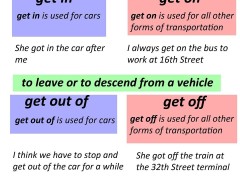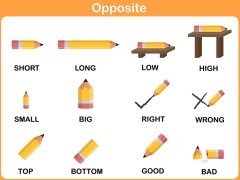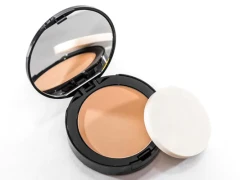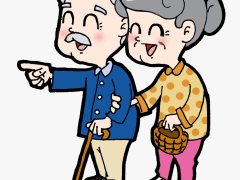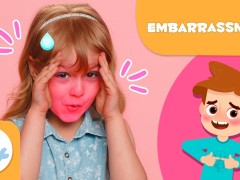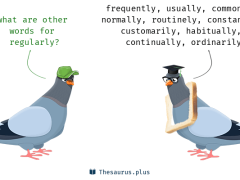excited [ikˈsaitid] adj. 兴奋的
* * *
A: I heard you were taking your vacation next week.
B: Yeah, I'm very excited.
A:我听说你下周要休假。
B:是啊,我很兴奋。
* * *
get on 登上
middle-aged [ˌmidl-ˈeidʒd] adj. 中年的
opposite [ˈɔpəzit] prep. 在……对面
【派】opposition 反对
【搭】opposite to 在……对面
opposite side 对边
* * *
A: Are there any restaurants still open at this time?
B: Yes, the one opposite the road is open 24 hours a day.
A:有饭馆这个时候还在营业吗?
B:是的,马路对面那家店24小时营业。
* * *
curiously [ˈkjuəriəsli] adv. 好奇地
funny [ˈfʌni] adj. 可笑的,滑稽的
【扩】humorous 幽默的 witty 诙谐的
* * *
A: He is always good for a laugh.
B: He is a very funny person.
A:他总逗我乐。
B:他是一个很幽默的人。
* * *
powder [ˈpaudə] n. 香粉
compact [ˈkɔmpækt] n. 带镜的化妆盒
kindly [ˈkaindli] adv. 和蔼地
【构】kind(和蔼的)+ly(副词后缀)=kindly(和蔼地)
【搭】a kindly heart 慈悲的心肠
* * *
A: I'd like to buy a bottle of cleansing milk. Would you kindly give me some suggestions?
B: What kind of skin do you have, normal, oil or dry?
A:我想买瓶洗面乳,你能给我点儿建议吗?
B:您属于哪种肤质?中性的、油性的,还是干性的?
* * *
ugly [ˈʌɡli] adj. 丑陋的
amused [əˈmjuːzd] adj. 有趣的
smile [smail] v. 微笑
embarrassed [imˈbærəst] adj. 尴尬的,窘迫的
【扩】embarrassment 窘迫
* * *
A: I'm embarrassed of what I did.
B: Don't mention it.
A:我为自己做的事感到很尴尬。
B:别再提了。
Lesson 142 Someone invited Sally to a party. 有人邀请萨莉出席一个聚会。
Sally was invited to a party. 萨莉应邀出席一个聚会。
worried [ˈwʌrid] adj. 担心的,烦恼的
* * *
A: What are you worried about?
B: The coming examination. I haven't got everything ready.
A:你在愁什么?
B:即将到来的考试,我还没有做好准备呢。
* * *
regularly [ˈreɡjuləli] adv. 经常地,定期地
adjective [原级]激动的,兴奋的;忧虑的,气愤的;已激发的,受激的;性兴奋的 - I was excited about the possibility of playing football again.
verb [vt. 及物动词]使兴奋,使激动;激发,引起(excite 过去式和过去分词形式) - His eyes were bright and excited.
noun [专属名词]上车:指登上交通工具,如公共汽车、火车等。进展、相处 - The host fears the guests won't get on...
get in the car 小车
get on the train 大车
- Please get ready to get off the bus. 请做好下车的准备
adjective [原级]中年的;具有中年人特点的;适合于中年人的 - His sisters are grown up and his parents are middle-aged.
adjective [原级]完全相反的,截然不同的;相反的,另一边的;(在说话者、所指的人或物)对面的;(角)对的;(叶,芽)对生的 - All the cars driving in the opposite direction had their headlights on.
noun [抽象名词]对立的人(或物),对立面;反义词 - Ritter was a very complex man but Marius was the opposite, a simple farmer.
adverb [方式副词]在对面,在对过 - He looked up at the buildings opposite, but could see no open window.
preposition [位置和方向]在…对面,与…相对;与…合演,与…联袂演出 - Jennie had sat opposite her at breakfast.
adverb [方式副词]好奇地 - 'Are you really an artist?' Sara asked curiously. “
adjective [原级]滑稽的,有趣的;古怪的,难以解释的;微恙的,稍有不适的;生气的,不友好的;疯疯癫癫的;出故障的;可疑的,不诚实的;放肆的 - If you describe something as funny, you think it is strange, surprising, or puzzling.
noun [具体名词]<美>(报纸上的)滑稽连环漫画;<非正式>笑话 - It is not a wildly funny play.
adverb [方式副词]古怪地,奇怪地 - It's good you can see the funny side of the situation.
noun [具体名词]粉,粉末;扑面粉,美容粉;细雪,粉状雪;火药,炸药 - Put a small amount of the powder into a container and mix with water.
verb [vt. 及物动词]往(脸或身体)上搽粉;撒粉(状物)于(表面),以粉(状物)覆盖;使(某物)成粉状;变成粉末 - She powdered her face and applied her lipstick and rouge.
adjective [原级]小型的,袖珍的;紧凑的;紧密的,坚实的;矮小而健壮的;(演讲,作品)简洁的,简练的 - He was compact, probably no taller than me.
noun [具体名词]带镜小粉盒;合约,协定;小型汽车;袖珍物;坯块 - He had a compact and muscular body.
verb [vi. 不及物动词]压紧,压实;缩短,精简;订立(或签订)(协定) - Their bodies are sleek and compact.
adverb [方式副词]亲切地;温和地;仁慈地 - Will you kindly obey the instructions I am about to give?
adjective [原级]亲切的;和蔼的;体贴的;爽快的 - He was a stern critic but an extremely kindly man.
adjective [原级]丑陋的,难看的;(通常因涉及暴力、挑衅行为而)令人厌恶的,邪恶的,恶性的;无礼的;道德败坏的;可怕的,恐怖的;难听的,不悦耳的 - Dekkeret found the landscape startling in its ugliness.
adjective [原级]被逗乐的,觉得好笑的 - Sara was not amused by Franklin's teasing.
verb [vt. 及物动词]逗乐,逗笑;(提供)消遣(amuse 的过去式和过去分词形式) - We were all amused at his stories.
verb [vi. 不及物动词]微笑;微笑着说,以微笑表示;现出(笑容);觉得好笑,觉得高兴;惠及,赞许 - When he saw me, he smiled and waved.
noun [具体名词]微笑,笑容;一脸笑意,喜滋滋的(all smiles) - "There are some sandwiches if you're hungry," she said with a smile. “
laugh [lɑːf] [læf] : v./ n. 大笑
- He said and smiled.
- She is telling me a story with a smile.
- They are talking and laughing.
adjective [原级]尴尬的,窘迫的;拮据的,陷入经济困境的 - He looked a bit embarrassed.
verb [vt. 及物动词](使)尴尬,窘迫;使难堪,使为难(embarrass 的过去式和过去分词形式) - His clumsiness embarrassed him.
adjective [原级]担心的,发愁的 - He seemed very worried.
verb [vt. 及物动词]担心,发愁;使担忧,使发愁,使焦虑;烦扰,使不安宁(worry 的过去式和过去分词) - We're worried about his mental state.
adjective [原级]定期地,有规律地;频繁地,经常地;均匀地,匀称地;(语法)变化规律地 - She regularly goes parachuting.

